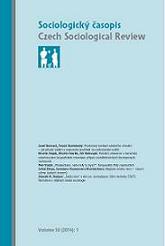„Šedá zóna“ v éře tzv. normalizace: Dům techniky ČSVTS Pardubice v dějinách české sociologie
The House of Technology in Pardubice: The ‘Grey Zone’ between Official and Dissident Sociology in Czechoslovakia in the 1970s and 1980s
Author(s): Zdeněk R. NešporSubject(s): Social Sciences
Published by: AV ČR - Akademie věd České republiky - Sociologický ústav
Keywords: House of Technology in Pardubice; Czech sociology; history of sociology; communism; sociology of work; sociology of organisation
Summary/Abstract: The Marxist-Leninist ‘ideological supervision’ of Czech sociology in the 1970s and 1980s led to the de facto academic impotence of ‘official’ institutions at universities and the Czechoslovak Academy of Sciences. However, sociological inquiry and discussion found a home, at least temporarily, in various less regulated departmental, regional and technical institutes, which came to represent the ‘grey zone’ of contemporary Czech sociology, i.e. the space between official, state-sanctioned sociological work and prohibited, dissident sociology (and where a significant number of persecuted sociologists were able to retain their jobs). One such institute, the House of Technology in Pardubice, played a particularly significant role in the 1970s and, to a lesser extent, in the 1980s. For a decade after 1969 it hosted the dissolved academic Department of the Sociology of Industry (V. Herstus, O. Sedláček, D. Slejška) and its research activities, the former Institute for Social Analysis (from Hradec Králové), and a further 20–30 external (part-time) workers. The House of Technology conducted around 150 empirical surveys, especially in the fields of the sociology of work and the sociology of organisation and published a number of books in the field of sociology and its own journal, Analýza (Analysis), which in the first few years presented theoretical discussions and later the results of empirical research. In this article the author provides a broad analysis of the organisational background and results of the various activities of the House of Technology, which, whilst significant in terms of Czech sociology at the time, were, the author concludes, unable to serve as an effective substitute for real academic work. Indeed, it was more a research than an academic institution and the main contribution it made to Czech sociology was the professional ‘life jacket’ it offered persecuted scholars.
Journal: Sociologický časopis / Czech Sociological Review
- Issue Year: 50/2014
- Issue No: 01
- Page Range: 107-130
- Page Count: 24
- Language: Czech

